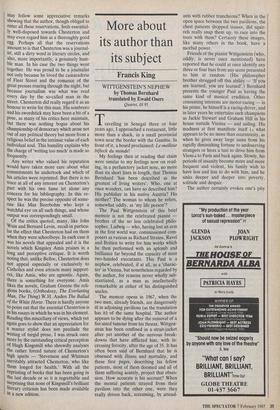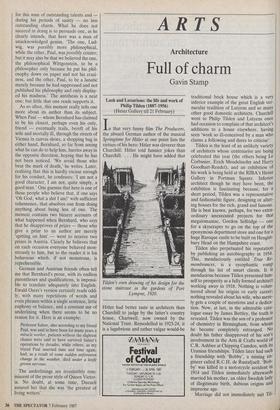More about its author than its subj ect
Francis King
WITTGENSTEIN'S NEPHEW by Thomas Bernhard translated by Ewald Osers
Quartet, £8.95
Travelling in Senegal three or four years ago, I approached a restaurant, little more than a shack, in a small provincial town near the border with the Gambia. In front of it, a board proclaimed: Le meilleur bifteck du monde!
My feelings then at reading that claim were similar to my feelings now on read- ing, in a perfunctory jacket note, no more than six short lines in length, that Thomas Bernhard 'has been described as the greatest of living writers'. Who, one at once wonders, can have so described him? His publisher in his native Austria? His mother? The woman to whom he refers, somewhat oddly, as 'my life person'?
The Paul Wittgenstein of this brief memoir is not the celebrated pianist brother of the no less celebrated philo- sopher, Ludwig — who, having lost an arm in the first world war, commissioned com- posers as various as Richard Strauss, Ravel and Britten to write for him works which he then performed with an aplomb and brilliance far beyond the capacity of most two-handed executants. This Paul is a nephew, celebrated, if at all, as a 'charac- ter' in Vienna, but nonetheless regarded by the author, for reasons never wholly sub- stantiated, as a man as intellectually remarkable as either of his distinguished uncles.
The memoir opens in 1967, when the two men, already friends, are dangerously ill in adjoining pavilions (as the translation has it) of the same hospital. The author appears to be dying after the removal of a fist-sized tumour from his thorax. Wittgen- stein has been confined in a strait-jacket after yet another of the nervous break- downs that have afflicted him, with in- creasing ferocity, after the age of 35. It has often been said of Bernhard that he is obsessed with illness and mortality, and these first pages, describing his fellow patients, most of them doomed and all of them suffering acutely, project that obses- sion. How accurate is his account? When the mental patients strayed from their pavilion into the other one, were they really driven back, screaming, by attend- ants with rubber truncheons? When in the open space between the two pavilions, the chest patients dropped tissues, did squir- rels really snap them up, to,race into the trees with them? Certainly these images, like many others in the book, have a morbid power.
Friends of the pianist Wittgenstein (who, oddly, is never once mentioned) have reported that he could at once identify any three or four bars from any score presented to him at random. (His philosopher brother shrugged off this ability — 'If you are learned, you are learned'.) Bernhard presents the younger Paul as having the same kind of musical erudition. Other consuming interests are motor-racing — in his prime, he himself is a racing-driver, and in later years he entertains such champions as Jackie Stewart and Graham Hill in his house outside Vienna — and sailing. His madness at first manifests itself what appears to be no more than eccentricity, as when he gives away large sums from his rapidly diminishing fortune to undeserving strangers or hires a taxi to drive him from Vienna to Paris and back again. Slowly, his periods of insanity become more and more frequent and violent, his family wish to have less and less to do with him, and he sinks deeper and deeper into poverty, solitude and despair.
The author certainly evokes one's pity for this man of outstanding talents and during his periods of sanity — no less outstanding charm. What he does not succeed in doing is to persuade one, as he clearly intends, that here was a man of unacknowledged genius. `The one, Lud- wig, was possibly more philosophical, while the other, Paul, was possibly crazier; but it may also be that we believed the one, the philosophical Wittgenstein, to be a philosopher only because he put his phil- osophy down on paper and not his crazi- ness, and the other, Paul, to be a lunatic merely because he had suppressed and not published his philosophy and only display- ed his madness.' The antithesis is a neat one; but little that one reads supports it.
As so often, this memoir really tells one more about its author than its subject. When Paul — whom Bernhard has claimed to be his closest, perhaps even his only, friend — eventually trails, bereft of his wife and mortally ill, through the streets of Vienna in canvas shoes, a shopping bag in either hand, Bernhard, so far from seeing what he can do to help him, hurries away in the opposite direction, hoping that he has not been noticed. 'We avoid those who bear the mark of death,' he writes. Later, realising that this is hardly excuse enough for his conduct, he confesses: `I am not a good character, I am not, quite simply, a good man.' One guesses that here is one of those people who believe that, if one says `Oh God, what a shit I am!' with sufficient vehemence, that absolves one from doing anything about being less of one. The memoir contains two bizarre accounts of what happened when Bernhard, who says that he disapproves of prizes — those who give a prize to an author are merely `spitting on him' — went to receive two prizes in Austria. Clearly he believes that on each occasion everyone behaved mon- strously to him, but to the reader it is his behaviour which, if not monstrous, is reprehensible.
German and Austrian friends often tell me that Bernhard's prose, with its endless parentheses and qualifications, is impossi- ble to translate adequately into English. Ewald Osers's version certainly reads odd- ly, with many repetitions of words and even phrases within a single sentence, little euphony or balance, and a constant use of underlining when there seems to be no reason for it. Here is an example: Professor Salmi-, also according to my friend Paul, was said to have been for many years a miracle worker, patients without the slightest chance were said to have survived Salzer's operations by decades, while others, as my friend Paul asserted time and time again, had, as a result of some sudden unforeseen change in the weather, died under a knife grown nervous.
The underlinings are irrestistibly rem- iniscent of the prose style of Queen Victor- ia. No doubt, at some time, Disraeli assured her that she was `the greatest of living writers'.



















































 Previous page
Previous page